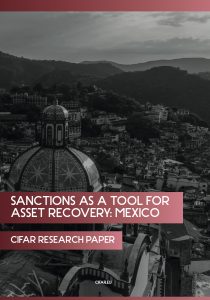Sanctions As a Tool For Asset Recovery: Mexico
To read this post in Spanish click here
This report is part of a series of national studies assessing the impact of international sanctions. Read other reports here: Moldova, Mozambique, Kenya
This research study assesses the current state of play in the use of sanctions as an asset recovery tool, examining their application in Mexico, and their prospects for addressing grand corruption.
To date, the effectiveness, drawbacks, and limitations of using sanctions as an anti-corruption at the global and regional levels to respond to cases of suspected grand, cross-border corruption has not been assessed. In part, this is because the use of sanctions for cases of corruption is rather new and is usually tied to human rights abuses or cases of political instability.
However, because of this and the political nature of sanctions and their growing usage as one of the anti-corruption tools, there is room to consider whether this approach is the most effective to take or whether other mechanisms, such as those based on legal processes, could be more effective and more rules-based in fighting this form of corruption.
Key findings
- Mexico has recently established several, new legal frameworks aimed at improving the fight against corruption and the recovery of stolen assets, including the temporary disqualification of public officials and allowing for the extinction of domain.
- While Mexico has sufficient regulatory frameworks for the location, seizure, and recovery of assets at the domestic and international levels, until now use of these laws has been sporadic and has only brought modest results.
- Prosecution of transnational corruption originating in Mexico, including the seizure of assets has taken place in the United States, however, this has not yet translated into the return of capital back to Mexico.
- Magnitsky legislation has broadened the scope of individuals who can be sanctioned in the US for corruption in Mexico, however, few Mexican designations have so far been made under the Global Magnitsky Act and the FCPA and Kingpin Act have been to date more relevant for asset recovery to Mexico.
- Although Magnitsky legislation encourages the engagement of civil society organizations in the designation process, the mechanisms for engagement and the types of evidence required are not entirely clear
Any further enquiries into the report or request for comment or quote can be directed to Lucia Cizmaziova, lcizmaziova@cifar.eu

